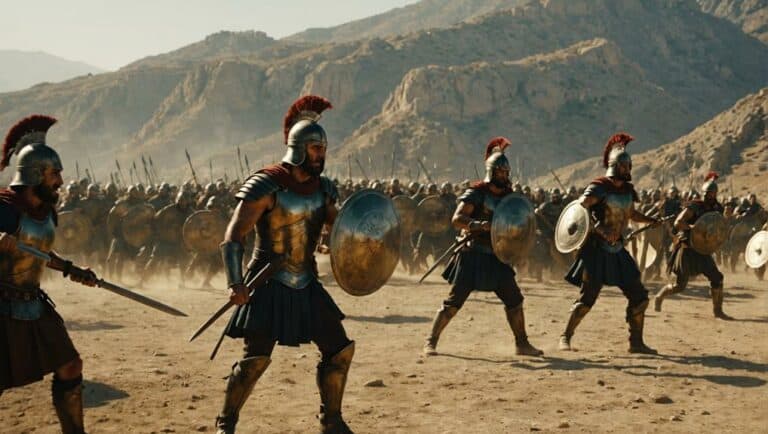In 490 BC, 10,000 Athenians, bolstered by Plataean allies, pulled off a stunning victory over the mighty Persian forces at Marathon using brilliant strategy and battlefield tactics.
Discover how this triumph not only saved Athens but also altered the course of Western civilization forever.
Historical Context
The Battle of Marathon, occurring in 490BC, was a pivotal event during the first Persian invasion of Greece, fundamentally altering the trajectory of the Greco-Persian Wars. As you explore this historical context, it's important to understand the significant players and outcomes.
The Athenians, supported by the small city-state of Plataea, faced the mighty Persian Empire led by generals Datis and Artaphernes. Despite being vastly outnumbered, the Greek forces managed to secure a decisive victory at Marathon.
This Greek victory was more than just a military triumph; it was a defense of Athenian democracy against the autocratic rule of the Persian Empire. The Athenians' ability to unite and strategize effectively against a formidable foe showcased the strength and potential of democratic governance.
Additionally, halting the Persian advance prevented the subjugation of Greece, which would have drastically altered the cultural and political landscape of the region.
Understanding this battle is vital for grasping how it inspired Western civilization's democratic ideals and political philosophy. The victory at Marathon not only shaped the ensuing Greco-Persian wars but also laid a foundation that influenced the development of modern democratic principles.
Causes of Conflict
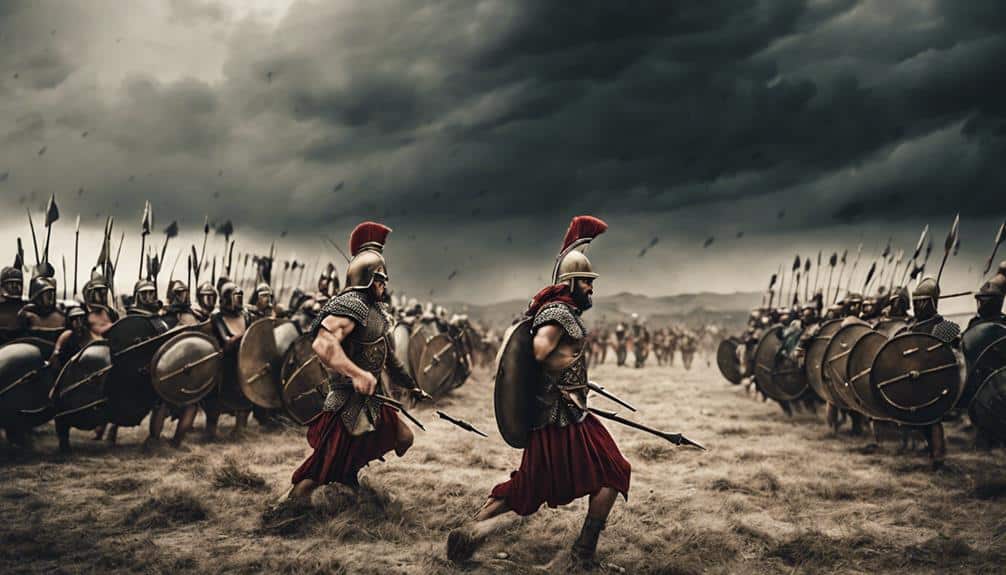
Athenian involvement in the Ionian Revolt in 499BC ignited the first sparks of conflict that culminated in the Battle of Marathon. By aiding the Ionian Greek city-states against Persian rule, Athens directly challenged the authority of Darius I. The Athenians' bold move to burn Sardis in 498BC particularly incensed Darius, making revenge a personal and political imperative for him.
The Persian victory at the Battle of Lade in 494BC was a decisive moment, leading to the quelling of the Ionian Revolt. This victory bolstered Darius's resolve to punish those who dared defy him, especially Athens and its ally, Eretria. The Persian invasion of Greece in 490BC was hence not just a military campaign but a calculated effort to assert Persian dominance over the Greek city-states.
Darius I entrusted his commanders, Datis and Artaphernes, with the mission to subjugate Greece. This invasion aimed to demonstrate Persian power and to quell any future rebellions. The Athenian involvement in the Ionian Revolt set off a chain of events, driven by the larger strategic and retaliatory goals of the Persian Empire, leading inevitably to the confrontation at Marathon.
Persian Invasion
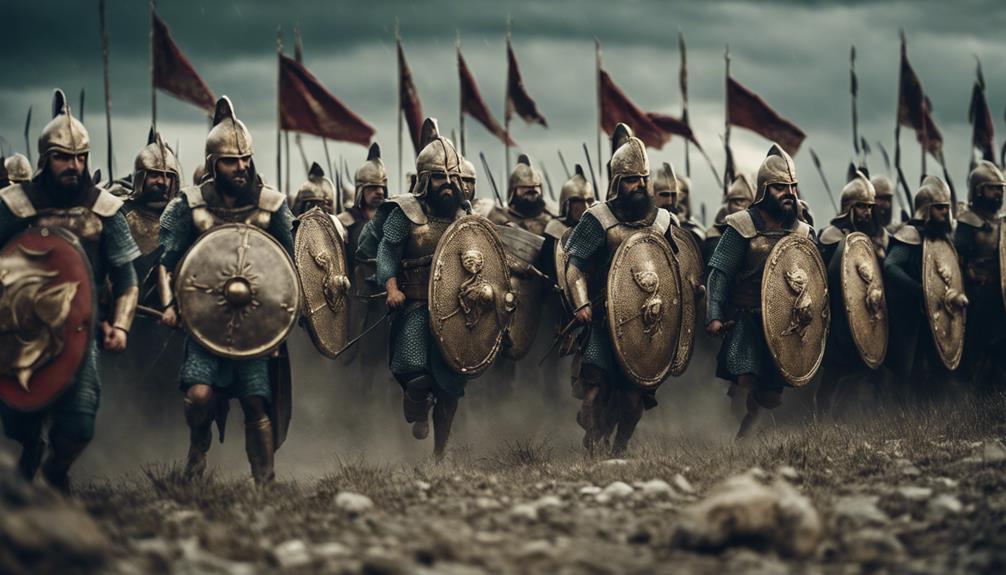
Initiating their campaign with a formidable display of naval power, Datis and Artaphernes set out on a mission to subdue the defiant Greek city-states and reassert Persian dominance. The Persian invasion of Greece in 490 BC was a direct response to Athenian involvement in the Ionian Revolt, which had challenged Persian authority. Under the orders of Darius I, the Persian fleet aimed to punish Athens and Eretria, key supporters of the revolt.
The invasion force, consisting of thousands of Persian troops, landed at the plains of Marathon, a strategic location chosen for its proximity to Athens. The Persian strategy was to swiftly crush resistance and demonstrate their might. However, they faced unexpected resistance from the Greek army. The Athenians, bolstered by a small contingent from Plataea, quickly mobilized to confront the invaders.
The Battle of Marathon wasn't just a clash of armies but a significant turning point in the Greco-Persian Wars. Despite being outnumbered, the Greek forces managed to block the Persians effectively. The Athenians' tactical ingenuity and determination played pivotal roles in their success. This encounter set the stage for future confrontations and highlighted the resilience of the Greek city-states against Persian aggression.
Greek Preparations
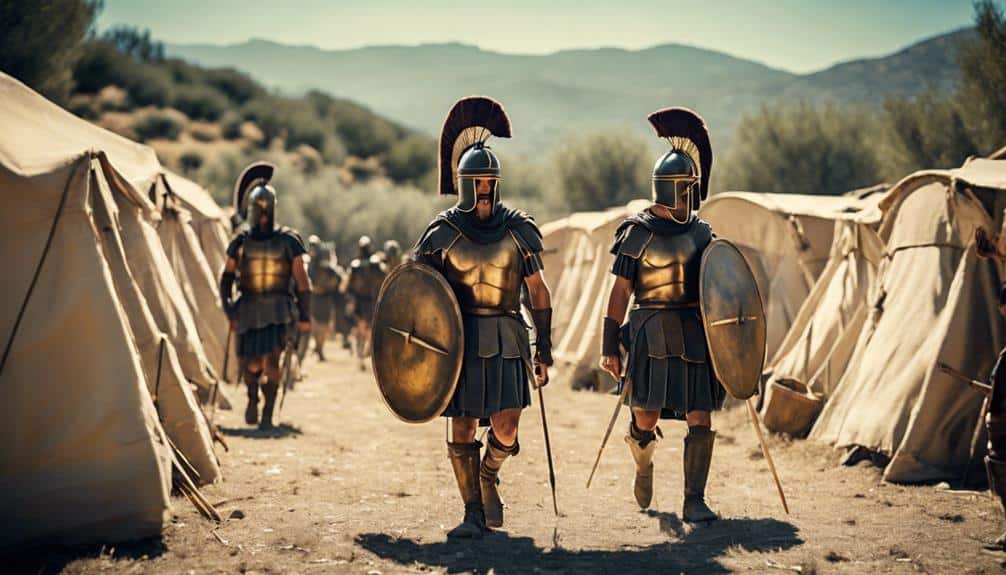
When analyzing the Greek preparations, you should note their strategic choice of Marathon's battlefield to neutralize the Persian cavalry's effectiveness.
Additionally, the Spartans' absence due to a religious festival forced the Athenians and Plataeans to adapt their tactics, blocking all exits to prevent Persian flanking.
This careful planning by Miltiades set the stage for their decisive attack.
Strategic Battle Location
The choice of Marathon as the battleground was a calculated move, designed to leverage the Greek infantry's strengths and counteract the Persian cavalry's mobility. The Greeks understood that the terrain at Marathon was ideal for their phalanx formation, which relied heavily on disciplined, close-order infantry combat. By choosing this strategic location, they effectively neutralized the Persian army's advantage in cavalry and placed the battle on terms favorable to their own forces.
The Athenians, joined by their allies, the Plataeans, positioned themselves to block the exits from the plain of Marathon, maintaining control over the battlefield. This maneuver prevented the Persian army from utilizing their cavalry's agility to outflank or outmaneuver the Greek forces. The narrow and marshy terrain further restricted the Persian army's movements, making it difficult for them to deploy their full strength.
Greek general Miltiades capitalized on these geographical advantages by ordering a decisive general attack. This aggressive strategy, combined with the advantageous terrain, allowed the Greek infantry to engage the Persian forces effectively. The result was a stunning Greek victory, demonstrating how critical the choice of battlefield can be in determining the outcome of a battle.
Spartan Festival Delay
Despite their urgency, the Athenians had to face the reality that Spartan reinforcements wouldn't arrive in time due to the Spartans' unwavering commitment to their religious festival. The Spartans were in the midst of the Karneia, a substantial religious observance that strictly prohibited them from engaging in military activities until its conclusion. This Spartan festival caused a critical delay in their support, leaving the Athenians to prepare for the imminent Persian invasion without the full strength of the Greek forces.
The Athenians had hoped that Spartan support would bolster their defenses against the much larger Persian army. However, the religious festival held such importance for the Spartans that it overrode immediate military concerns. The delay in Spartan reinforcements forced the Athenians to make swift strategic adjustments. They had to rely on their own forces and the contingent from Plataea, which meant going into battle with fewer troops than initially anticipated.
This situation illustrates the complexities of ancient Greek warfare, where religious obligations could substantially impact military decisions. Despite the delay, the Athenians and their allies managed to secure a decisive victory at Marathon, showcasing their resilience and strategic acumen in the face of overwhelming odds.
Leaders and Forces
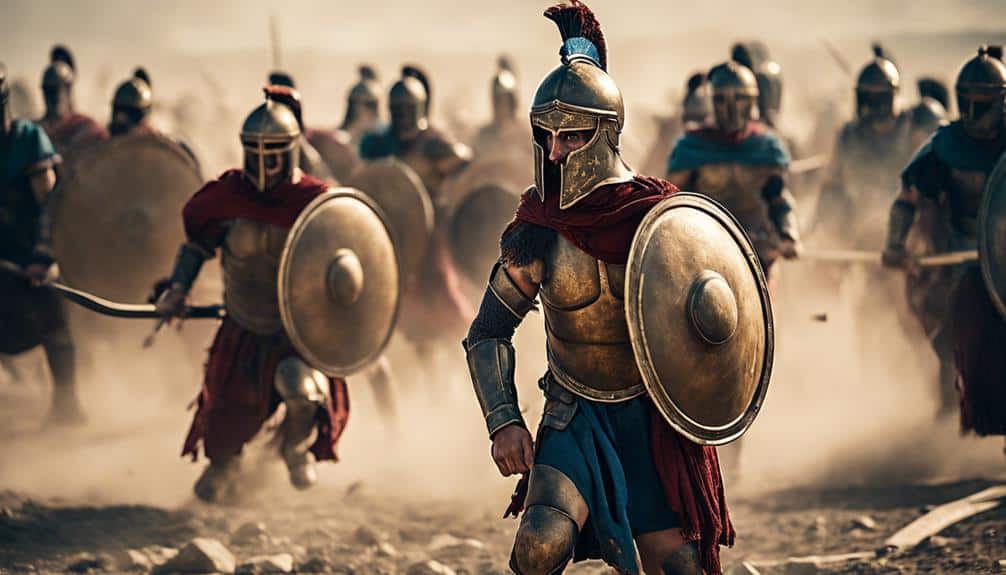
Admiral Datis and Artaphernes, rather than King Darius I, commanded the Persian forces at Marathon, leading an army that included 10,000 cavalrymen and the elite 10,000 Immortals. This formidable force, totaling around 150,000 men, also comprised approximately 50,000 Persian infantrymen. The Persian troops were well-equipped, with their famed archers and cavalry forming a key part of their strategy.
On the other side, the Athenian army, though outnumbered, was led by the capable Athenian general Miltiades. This force included 10,000 Athenians and an additional 1,000 soldiers from Plataea, who played an important role in the battle. Despite their smaller numbers, the Greeks' well-coordinated efforts proved decisive.
The Battle of Marathon marked a notable turning point in Greek civilization. The defeat of the Persian troops by the Athenian army not only boosted Greek morale but also demonstrated that a smaller, well-trained force could triumph over a larger one. This victory was crucial, as it preserved Greek independence and set the stage for future conflicts. Understanding the leaders and forces involved provides key context for comprehending the magnitude of this historic clash.
Battle Strategies
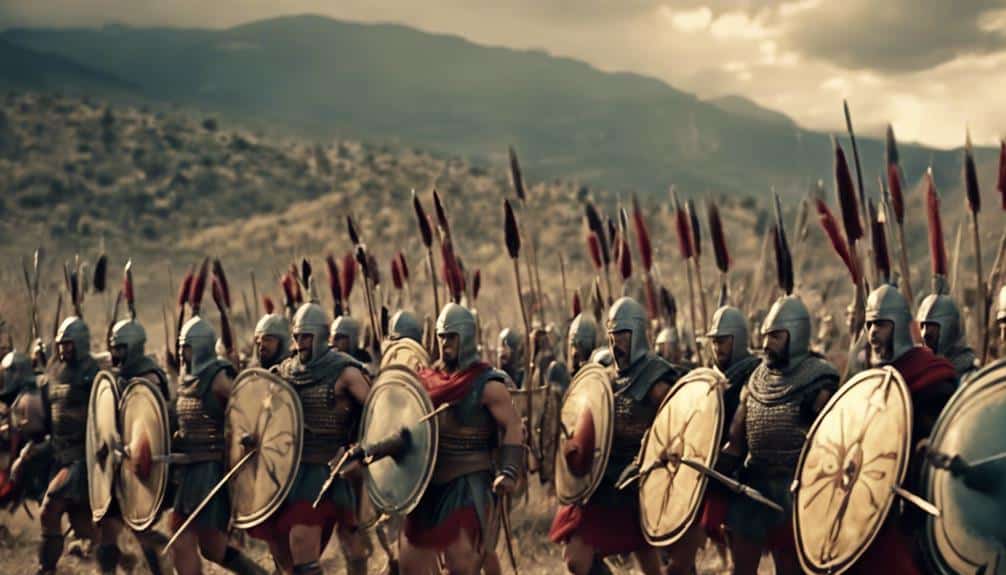
In the heat of the battle, Athenian forces utilized their hoplite phalanx formation to counter the overwhelming numbers of the Persian army. The hoplite phalanx, a dense and disciplined formation of heavily armed infantry, proved essential in maintaining cohesion and presenting a solid front against the Persians. Greek military strategies emphasized the importance of unity and coordination, allowing the Greek forces to stand firm against the enemy's advances.
Athenian general Miltiades played a crucial role in the execution of these strategies. He ordered a swift and decisive attack to catch the Persian army off guard, capitalizing on their underestimation of Greek hoplite tactics. By reinforcing the flanks, the Athenians aimed to envelop and crush the weaker Persian center, a maneuver that showcased their superior strategic planning and adaptability.
The Greek forces' discipline and adherence to their battle strategies allowed them to outmaneuver and outfight the larger Persian army. This victory at Marathon highlighted the effectiveness of Greek military strategies, demonstrating that well-coordinated and intelligently executed tactics could overcome numerical disadvantages.
The Athenian success wasn't just a tribute to their bravery but also to their strategic brilliance led by Miltiades.
Key Battle Moments
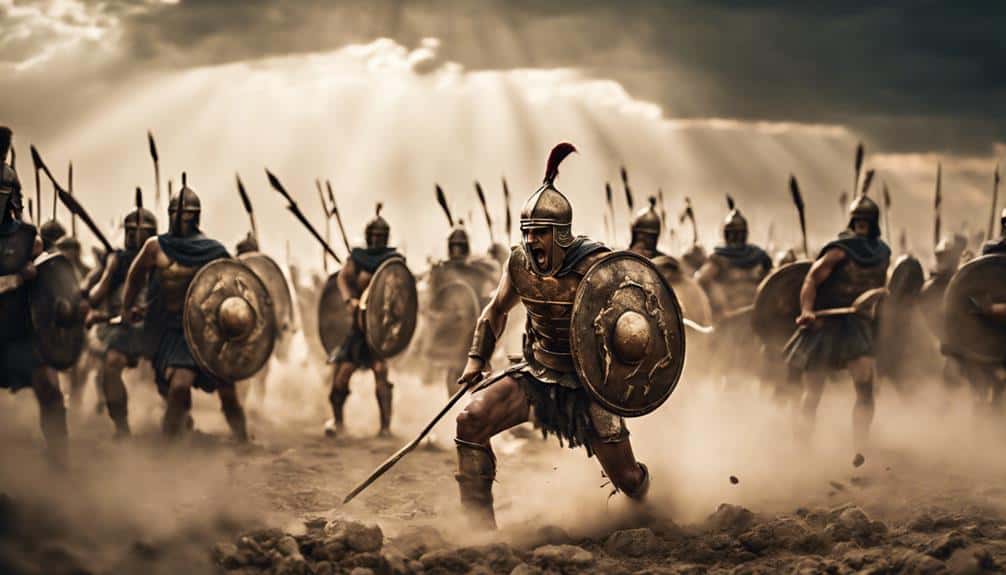
You'll see how the Athenians' flanking maneuver was pivotal, enveloping the Persian forces and causing chaos within their ranks.
As the Persians panicked and fled towards their ships, they suffered significant casualties.
Flanking Maneuver Execution
During the Battle of Marathon, the Athenians' strategic flanking maneuver was a pivotal moment that allowed their forces to envelop and decisively defeat the more numerous Persian army. The Athenians cleverly reinforced their flanks, which became the cornerstone of their strategy. By strengthening the wings of their formation, they prepared to execute an inward wheeling movement that would encircle the Persians.
As the battle commenced, the Greeks maintained a deliberate and disciplined approach. The center of the Athenian line, deliberately weakened, engaged the Persian army head-on but gradually gave ground. This tactical retreat wasn't a sign of defeat but a calculated move designed to draw the Persians inward, creating an opportunity for the reinforced Athenian flanks.
When the flanking maneuver was executed, the Athenian wings wheeled inward with precision, enveloping the Persian army. This movement caught the Persians off guard, leading to chaos within their ranks. The Athenians' ability to surround and overwhelm the Persians from the sides and rear was instrumental in securing the Greek victory at Marathon.
The effectiveness of this strategic flanking maneuver can't be overstated. It demonstrated the Athenians' military ingenuity and contributed significantly to their success against a larger Persian force.
Persian Forces' Retreat
The Persian forces, overwhelmed by the Athenians' unexpected and disciplined flanking maneuver, panicked and began a chaotic retreat toward their ships. Despite their numerical advantage, the Persians were caught off guard by the precision and intensity of the Athenian attack. This sudden shift in the battlefield dynamics led to disarray within the Persian ranks, prompting an immediate and uncoordinated withdrawal.
As the Persians fled, the Athenians pursued them relentlessly. The pursuit resulted in heavy casualties for the retreating Persian forces, who struggled to maintain any semblance of order. The Athenians capitalized on their momentum, striking down many Persians who were unable to reach their ships in time. This relentless pursuit not only inflicted significant losses but also demoralized the remaining Persian soldiers, further ensuring their retreat was chaotic and ineffective.
The Persian retreat marked the end of the first Persian invasion of Greece. The Battle of Marathon became a pivotal turning point in the Greco-Persian Wars, demonstrating the effectiveness of Greek military strategy and bolstering the morale of the Greek city-states. The victory at Marathon provided a significant boost to Athenian confidence and set the stage for future Greek resistance against Persian aggression.
Immediate Aftermath
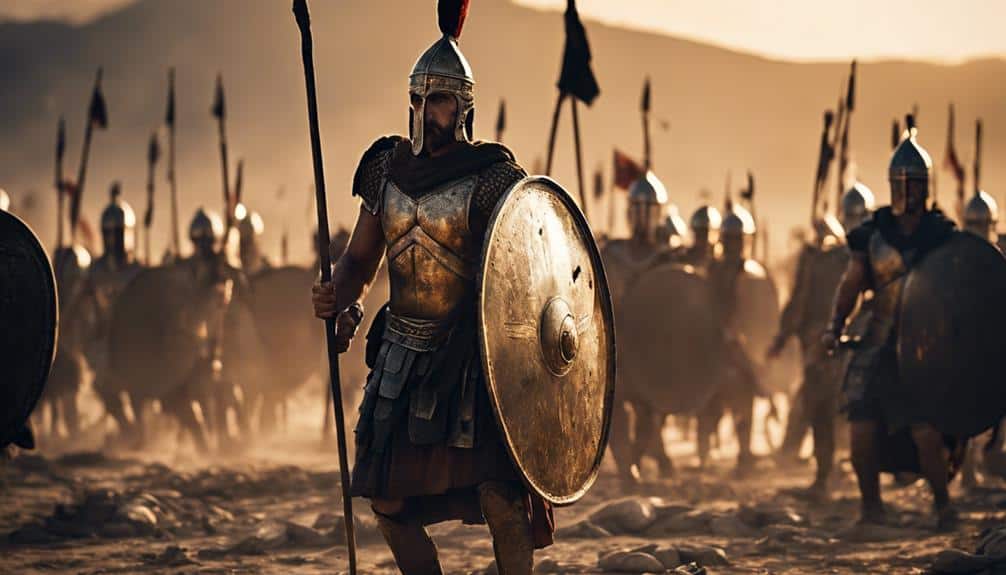
In the immediate aftermath of the Battle of Marathon, Athenians relentlessly pursued the retreating Persian forces, inflicting further casualties as they fled towards their ships. As the Persians began their chaotic withdrawal, the Athenians pursued with determination, slaughtering fleeing Persians and ensuring that their enemies couldn't regroup. This pursuit was pivotal in solidifying the Athenian victory and marked the end of the first Persian invasion.
Greek casualties were relatively minor compared to the significant losses suffered by the Persians. Approximately 192 Athenians and 11 Plataeans were killed, a stark contrast to the 6,400 to 7,000 Persian soldiers who perished. This difference in casualties underscored the effectiveness of the Greek tactics and the discipline of their hoplites.
The decisive victory at Marathon had immediate consequences for both sides. For the Greeks, it was a moment of immense pride and morale boost, demonstrating that they could successfully defend their homeland against a powerful adversary. For the Persians, this defeat was a significant setback, compelling them to reconsider their strategy against the resilient Greek city-states.
The aftermath of Marathon set the stage for future confrontations, altering the course of Greek and Persian history.
Long-term Impact
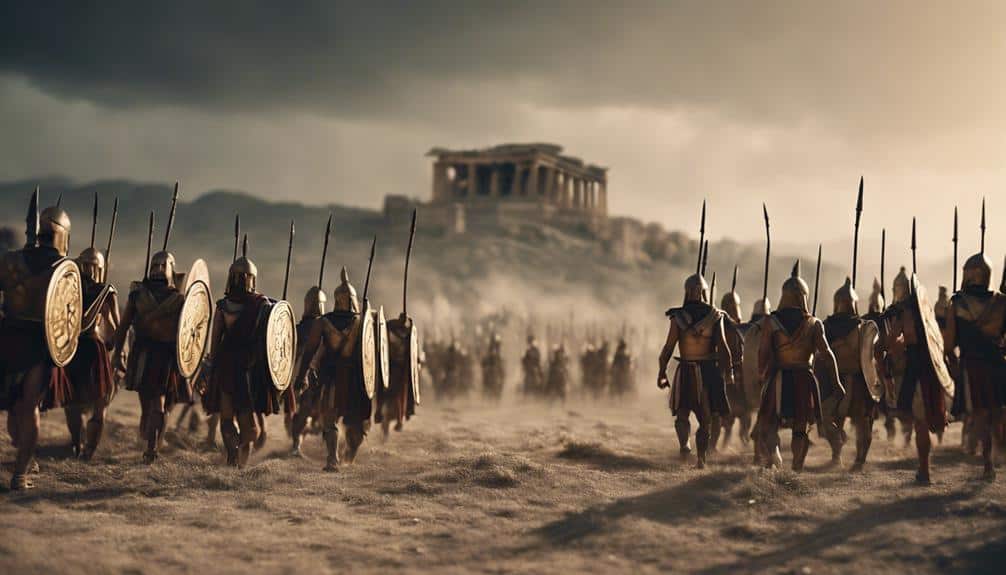
Victory at Marathon didn't just end the immediate Persian threat; it fundamentally altered the trajectory of Greek civilization and its democratic institutions. This Athenian triumph guaranteed the survival of Greece, providing a vital buffer that allowed its city-states to cultivate democracy and intellectual progress.
According to Herodotus's account, the resolve and unity displayed by the Athenians at Marathon became a defining moment, inspiring future generations to defend their autonomy and democratic values.
The battle's long-term impact on Western Civilization can't be overstated. The preservation of Greek culture meant that philosophical, artistic, and scientific advancements could flourish, essentially laying foundational principles for Western thought and democratic governance. Had the Persians succeeded, the historical and cultural development of Greece—and consequently, Western Civilization—might have taken a vastly different path.
Moreover, the victory at Marathon symbolized resilience and endurance, attributes that resonate even today. The modern marathon race, inspired by this historic event, serves as a lasting tribute to the Athenian spirit.
Essentially, Marathon's significance extends far beyond the battlefield, shaping the course of Mediterranean and European history for centuries to come.
Enduring Legacy

You can see the enduring legacy of the Battle of Marathon in its preservation of Greek democracy, which paved the way for cultural and intellectual flourishing.
This victory didn't just safeguard a city-state; it laid the groundwork for the ideals that form the bedrock of Western civilization.
Preservation of Greek Democracy
By repelling the Persian invasion at Marathon, the Athenians not only safeguarded their city but also secured the survival and flourishing of their democratic system.
The Athenian victory at Marathon wasn't just a military triumph; it was a critical moment for the preservation of Greek democracy. The citizens of Athens, who fought in the egalitarian army, embodied democratic ideals by participating voluntarily and equally in the defense of their homeland.
This victory had profound implications for the future of democracy in Greece:
- Reinforcement of Democratic Ideals: The active participation of Athenian citizens in the battle against the Persians strengthened the principles of equality and civic responsibility central to Greek democracy.
- Preservation of Athens' Political System: By averting Persian conquest, the Athenians secured that their democratic system remained intact, allowing it to develop and influence future generations.
- Symbol of Democratic Triumph: Marathon became a symbol of the victory of democratic values over autocratic rule, inspiring other Greek city-states and future democracies.
The preservation of Greek democracy following Marathon's victory secured that democratic ideals would flourish and become a lasting legacy, shaping political thought and practice for centuries to come.
Cultural and Intellectual Flourishing
The triumph at Marathon ignited a period of profound cultural and intellectual flourishing in ancient Greece, leaving an enduring legacy that shaped Western civilization. The victory not only preserved Athenian democracy but also provided the confidence needed for its expansion. This political stability created fertile ground for cultural flourishing and intellectual development.
In the years following Marathon, Athens became a hub of artistic expressions and philosophical thought. Significant advancements in drama, sculpture, and architecture emerged, reflecting the newfound pride and identity of the Greek people. The Parthenon, a symbol of Athenian democracy and Greek ideals, stands as proof of this era's artistic achievements.
Moreover, the intellectual development that followed Marathon produced some of history's greatest minds. Philosophers like Socrates, Plato, and Aristotle explored ideas that would influence Western thought for millennia. Their work on ethics, politics, and science laid the foundation for various disciplines.
The battle's legacy endured, symbolizing the triumph of Greek ideals such as freedom, democracy, and individualism. This cultural and intellectual flourishing wasn't just a temporary phenomenon; it left an indelible mark on the course of history, contributing to the values that underpin modern Western civilization.
Western Civilization's Origins
Marathon's victory stands as a cornerstone in the origins of Western civilization, marking a moment where the preservation of Athenian democracy catalyzed a series of events that would shape the cultural and intellectual landscape of the Western world.
When the Athenians won against the Persian forces in the 5th century BC, it wasn't just a military triumph; it was a decisive moment for democracy and Western ideals.
The victory at Marathon did more than save Athens from immediate destruction; it safeguarded a nascent democratic society that would influence countless generations. This battle demonstrated to the world that a smaller, well-organized force could successfully defend their way of life against a larger empire. The Greeks attacked with strategic brilliance, catching the Persian forces off guard.
Consider these three enduring impacts:
- Democratic Resilience: The preservation of Athenian democracy eventually inspired political systems worldwide.
- Cultural Flourishing: The victory allowed for a Golden Age in Athens, fostering advancements in philosophy, arts, and sciences.
- Endurance Symbolism: The marathon race, inspired by this event, symbolizes human perseverance and determination.
Understanding the victory at Marathon is essential to appreciating the roots of modern Western civilization. It encapsulates a pivotal moment where bold action and democratic ideals triumphed against overwhelming odds.


